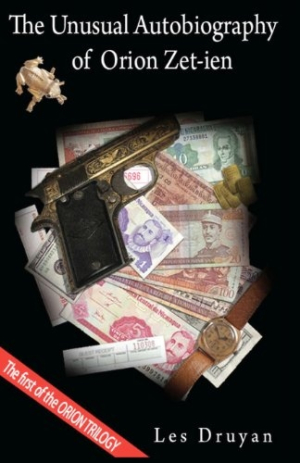
The Unusual Autobiograpy of Orion Zet-ien
“Everyone lies, everyone steals, which you already know and mustn’t ever forget.” So instructs the uncle of a young Chinese-American man as he embarks upon a career in the family business in New York’s Garment District in the 1960s. Les Druyan’s extremely well-crafted fictional autobiography of that young man is as much an exposé of the corruption and creative accounting of that business as it is a coming-of-age story, and Druyan pieces them together as seamlessly as the ladies who make the sweaters for the family’s Shanghai Girl clothing line.
The Unusual Autobiography of Orion Zet-ien is brought to life so richly with the names, places, events, sights, sounds, and smells of New York in the late 1950s and early 1960s that it could pass for an authentic autobiography rather than a memoir of the fictional character created by Druyan. The thirteen years in the life of Orion—from age twelve to twenty-five—is billed as the first book in a trilogy.
Orion—named such “so that if he was ever lost and could find Orion’s Belt in the sky he could find his way”—experiments with sex and drugs, listens to music, watches television, and does all of the things any normal teen and young adult did then. What makes his story unique is the family and the family business to which he belongs. They are a colorful and quirky bunch, even slightly outlandish, but also very real. Orion’s friends, and especially his girlfriends, similarly ring true in the pages of Druyan’s novel.
The Unusual Autobiography of Orion Zet-ien is not for every reader. It is very New York-centric and era-specific, and it is written entirely from the point of view of a randy young man who freely admits that he is “addicted to women.” There is also a lot more detail about the garment business than many readers may care for. Druyan includes a number of period photographs, and while this adds a nice touch, neither the photos nor the footnotes about Macy’s, Herald Square, hop-scotch (or “potsy”), or the meaning of “SOL” are really necessary. In some ways, these additions detract from the reading, as they break the pacing and shift the reader’s eye and mental focus away from the story.
These criticisms aside, Druyan’s book is a good and entertaining read. It serves as an education of the way business is done in the real world, and how many companies, especially the smaller ones, survive based on the amount of “fluce” (untaxed, under-the-table income) they generate rather than on what they make from legitimate sales. As Orion’s uncle reminds him, “he who gives the most fluce gets the most business.”
Druyan touches on many themes that are key to the period in his book, from homosexuality and race relations to politics and religion. It is on this last point that the author is at his most humorous. Orion is raised “as a Humanist.” As Druyan has his main character explain, this means that “I don’t get as many holidays off as the rest of the kids. And I don’t have a symbol like a cross or a star to wear on a chain like a lot of the other kids do. You can’t wear a thing around your neck that says ‘Nothing Yet.’”
This is what makes Orion truly engaging. He is a man without a label on a voyage of discovery in a confusing, often contradictory, and always surprising world.
Reviewed by
Mark G. McLaughlin
Disclosure: This article is not an endorsement, but a review. The publisher of this book provided free copies of the book and paid a small fee to have their book reviewed by a professional reviewer. Foreword Reviews and Clarion Reviews make no guarantee that the publisher will receive a positive review. Foreword Magazine, Inc. is disclosing this in accordance with the Federal Trade Commission’s 16 CFR, Part 255.
